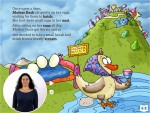A person – as opposed to an avatar – signs American Sign Language in the eMotion Stories app.
It is hard to beat the pleasure of sitting down with your children or grandchildren and reading them a bedtime story, whether that story is a classic like Goldilocks, a Yiddish folktale or even a book written by someone you know. This simple pleasure was not even an option until recently for families with deaf kids, as Israeli American, Eyal Rosenthal, 34, discovered.
While visiting family in New York, Rosenthal had a chance to read a bedtime story to his nephew before heading out to visit with a friend over coffee. Rosenthal told his friend about his nephew, and she told him about her niece, who was born deaf.
“I asked her how she reads to her niece,” said Rosenthal. “She said, ‘We don’t…. We can go to Barnes and Noble across the street and you can find some books with baby sign language or whatever, but you won’t find any actual story to read to a deaf child.’”
Learning of this inspired Rosenthal to look for a solution. “Being an Israeli, we tend to think we can solve everything,” he noted. And, in this case, he could – he created an app called eMotion Stories.
Coming from a high-tech background and being an investor/developer of apps, Rosenthal initially mulled over the idea of creating an avatar to sign the books for eMotion Stories, but found that it was much simpler and less costly to have a live person do it.
“It’s the placement of a sign, the body language within that,” said Rosenthal. “To try to get an avatar to do that is incredibly difficult and costly, and probably something that’s 10 years down the road.”
The other problem Rosenthal encountered was that sign language varies from country to country. “It’s not a universal language,” he said. “Each country, each region, actually develops on its own.”
While Rosenthal was able to overcome most obstacles by himself, there were two that stumped him – the sign language itself, as noted, and the development work of the videos. “One of the good things about being in Israel, especially in Tel Aviv, is there are developers everywhere,” he said.
Rosenthal found Go UFO, a company that was just getting started at that time. On connecting with the Go UFO team, Rosenthal said, “It was like two minds meeting. The moment they heard the idea, they were like, we love this, we love your passion for it, we want to help you create it.”
Choosing the stories to feature was the next challenge. Rosenthal decided to start with the Brothers Grimm.
Since the whole concept began with Rosenthal wanting to enable his friend to share a story with her niece, he opted to do the stories in American Sign Language (ASL). And, to find a signer for the e-books, he went to New York Deaf Theatre. As for the illustrations, a Go UFO team member’s father was an illustrator, and he offered to have some of his friends help out (making it possible for Rosenthal to afford the illustrations).
“It was interesting convincing people to help when you don’t have the money to pay them what they want and you have to successfully convince them to do it anyway,” said Rosenthal. “That took some learning.”
As of now, five e-stories have been created for the iPad. When downloading the free app, the e-book of The Ugly Duckling is included. Each additional story is $4.59. The stories available are The Ugly Duckling and Goldilocks and the Three Bears so far, with Little Red Riding Hood, Cinderella and The Three Little Pigs coming soon.
Rosenthal would like to produce five more books.
“The classic stories are ones that a parent can relate to because he/she read that story as a child and they can read it to their child,” he said. “One of the unfortunate facts I uncovered in the research is that the level of comprehension for deaf children is several levels below that of [hearing] children. This is a gap that widens through the years. One thing I was hoping was, at least, to be able to bridge that gap. When you’re 6 years old and you’re one year behind, it’s not the same as when you’re in high school and you’re … behind.”
One of the goals Rosenthal has for this coming year is to create a version in another language, one similar to ASL, the simplest example of which would be Canadian Sign Language.
“The guys at Go UFO are trying to create more of a platform where any country can simply add its sign language videos or an individual can add videos to a particular story and modify the text, since the illustrations already exist, to make it more broad,” said Rosenthal.
So far, the app has been downloaded 3,000 times.
“I’ve gotten emails from parents saying that they love it and when are more stories going to come out,” said Rosenthal. “Some were asking when an android version would come out.”
Rosenthal would like to create an android version, but that will require more funding, which he hopes to raise with a Kickstarter or Indigogo campaign.
Many people have been helping move the project along, such as members of the Israeli Society for the Deaf and the Hard of Hearing. Rosenthal has also been recently approached by a deaf Israeli actor who asked Rosenthal to let him know when things proceed on the Israeli front because he would like to help.
Rosenthal said that without the Go UFO programmers eMotion Stories would never have come to fruition. “I’m incredibly indebted to those guys,” he said.
For more information about the app, visit emotionstories.com.
Rebeca Kuropatwa is a Winnipeg freelance writer.

